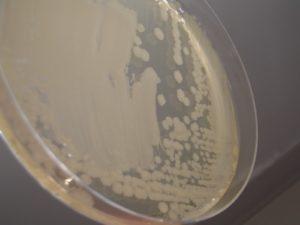
Culture of Corynbacterium from the skin (culture de Corynebacterium sur GTS). Source Manurx27 (own work), Wikimedia Commons
The skin, one of the first lines of immunological defence, is colonised by diverse microbes which play a crucial role in the control of skin immunity. However, only a handful of these microbes have been directly linked to defined immunological processes, particularly under inflammatory conditions. Research led by Yasmine Belkaid aimed to identify dominant microbe-derived metabolites that have immune modulatory capacity.
Corynebactrium sp. is one of the three most abundant bacterial genera on human skin, and is also abundantly found on mice. However, very little is known about their immunomodulatory effects. Researchers showed a direct relationship between Corynebactrium sp. and T cell function. Where increased proportions of IL-17+γδ T cells that express low levels of T cell receptor (TCR) (IL-17+γδTCRlow) were preferentially observed in the presence of Corynebactrium accolens compared with microbial sp.: E.coli, C.albicans, S.epidemidis.
Riduara et al., showed that IL-17+γδTCRlow T cells detected in the presence of C.accolens were predominantly Vγ4+, CCR6+ expressing high transcript levels of CCR4 and T cell activation markers (OX40, PD-1 and STAT5). To determine if high levels of IL-17+γδTCRlow is generally associated with Corynebactrium sp. Riduara et al., inoculated 9 different Corynebactrium sp. onto the skin of wild type mice. Surprisingly, they observed high proportions ofIL-17+γδTCRlow with all screened Corynebactrium sp. except C. amycolatum, a rare Corynebactrium species that does not have mycolic acids. This suggested that mycolic acid from Corynebactrium sp. is responsible for induction of IL-17+γδTCRlow T cells. To confirm this, they showed that no Vγ4+IL-17+γδTCRlow T cells were induced in the presence of mycolic acid-deficient C.accolens (Δ503). Additionally, Vγ4+IL-17+γδTCRlow T cells were not responsive to heat killed C.accolens nor dendritic cells loaded with lipoarabinomannans, molecules also present on the outer surface of Corynebactria. This confirmed that the presence of the metabolit, mycolic acid, is required for induction of Vγ4+IL-17+γδTCRlow.
Finally, researchers also showed that though Corynebactrium sp. in healthy mice is not associated with inflammation. Vγ4+IL-17+γδTCRlow T cells primed by Corynebactrium sp. contribute to increased skin inflammatory pathology in mouse models of experimental psoriasis and obesity.
Journal Article: Ridaura et al., 2018. Contextual control of skin immunity and inflammation by Corynebacterium. Journal of Experimental Medicine
Article by Cheleka AM Mpande











